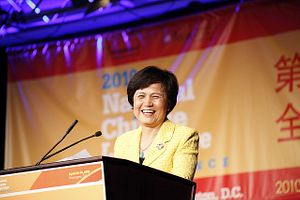In a dramatic move, a Chinese official had a single-page advertisement for Taiwan’s Chiang Ching-kuo Foundation for International Scholarly Exchange taken out of the program at the 20th conference of the European Association of Chinese Studies (EACS), held at the University of Minho in Portugal on July 22-26. The Chinese official was reportedly Madame Xu Lin, an adviser to China’s State Council and director general of the Chinese National Office for Teaching Chinese as a Foreign Language, known as “Hanban.” Xu’s high-handedness shocked many in and outside of Taiwan, at a time when cross-strait relations are relatively stable. Swift and harsh responses from Taiwanese officials and the public condemned the act and blamed Xu for hurting Taiwanese feelings and harming cross-strait relations. The Minho incident is a blow to China’s soft power. It not only widens the political and psychological gap between Taiwan and mainland China, but also risks canceling out much of the goodwill the Chinese government has painstakingly built toward Taiwan in the past few years.
Enhancing China’s image abroad has been a key aspect of China’s new diplomacy since the beginning of this century. The Confucius Institute (CI), with its primary purpose of promoting Chinese language and culture, has been a major official instrument of Chinese soft power since 2004. According to the Hanban website, which oversees CIs globally, as of mid-2014 China has established 443 CIs at colleges and 648 Confucius Classrooms (CCs) at public and private schools around the world. As the head of Hanban, Xu has become a symbol of China’s soft power efforts. It is perhaps ironic that a Chinese official whose job it is to promote China’s soft power has in effect done the opposite.
How effective has the CI been at improving China’s soft power abroad? The answer is unclear. Looking at various public opinion polls, such as those conducted annually by the Pew Research Center, one gets the general sense that China enjoys largely positive views in the developing world, especially in Africa, and largely negative views in Western democracies. China’s neighbors have more mixed views of China’s rise, ranging from extremely positive (such as in Pakistan) to extremely negative (such as in Japan). These results have by and large been consistent over the past few years, and the global expansion of the CIs and CCs seem to have had little impact.
Most perplexing for the Chinese government is that the Taiwanese public’s attitude toward the mainland has not improved, and over the last decade the percentage of people who consider themselves Taiwanese has risen sharply, while the percentage of those who consider themselves Chinese has fallen significantly. This identity shift has happened despite the fact that the economies situated on either side of the Taiwan Strait are highly interwoven; the two sides have signed about 20 agreements for economic and cultural exchanges, often with beneficial treatment to Taiwan offered by the mainland. China has failed to win the hearts and minds of the Taiwanese, and in the eyes of most Taiwanese, China is clearly not a country with much soft power. In an early July 2014 poll, conducted by Taiwan’s Mainland Affairs Council, only 33.4 percent of Taiwanese surveyed thought the Chinese government was friendly toward the Taiwanese, while 50.3 percent believed it to be unfriendly.
Xu has been in charge of Hanban since the first CI was established in Seoul in 2004, and her actions in Portugal definitely harm China’s soft power in Taiwan, as well as China’s international image in general. In the aftermath of the Minho incident, Hanban and the Chinese government should consider how to better promote China’s image abroad. Chinese officials and diplomats must also sharpen their public relations skills.
In June this year, the American Association of University Professors (AAUP) issued a statement calling on universities to uphold the principles of academic freedom by either terminating or renegotiating the agreements that have brought nearly 100 CIs to campuses across the U.S. The AAUP fears that American universities may have sacrificed the independence and integrity of their institutions and staff by allowing the Chinese government to set guidelines for the recruitment and supervision of academic staff, the design of the curriculum and the boundaries on debate within the CIs.
The AAUP apparently made sweeping judgments before conducting a thorough and objective investigation. Its statement cherry-picked a few examples to make its case while ignoring the larger picture, that the CIs and CCs operate within their host institutions and have helped many universities and school districts in offering in-demand Chinese language and culture-related courses, as testified to by many CI directors and instructors. In a public relations debacle, Hanban has yet to come up with a robust rebuttal and convincing response, leading many to believe that the AAUP statement is true.
China has a soft power deficit in the world because of its reluctance to embrace and practice universal values at home, and its presumptuous behavior in dealing with disputes abroad in recent years. The last thing China wants is the undoing of its limited, hard-earned soft power by its own officials.
Zhiqun Zhu is a professor of political science and international relations at Bucknell University in Pennsylvania, and a POSCO fellow at the East-West Center in Hawaii.

































